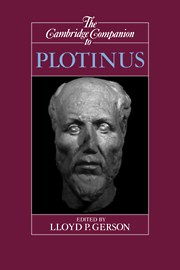Book contents
- Frontmatter
- Introduction
- 1 Plotinus
- 2 Plotinus's metaphysics of the One
- 3 The hierarchical ordering of reality in Plotinus
- 4 On soul and intellect
- 5 Essence and existence in the Enneads
- 6 Plotinus on the nature of physical reality
- 7 Plotinus on matter and evil
- 8 Eternity and time
- 9 Cognition and its object
- 10 Self-knowledge and subjectivity in the Enneads
- 11 Plotinus
- 12 Human freedom in the thought of Plotinus
- 13 An ethic for the late antique sage
- 14 Plotinus and language
- 15 Plotinus and later Platonic philosophers on the causality of the First Principle
- 16 Plotinus and Christian philosophy
- Bibliography
- Index
1 - Plotinus
The Platonic tradition and the foundation of Neoplatonism
Published online by Cambridge University Press: 28 May 2006
- Frontmatter
- Introduction
- 1 Plotinus
- 2 Plotinus's metaphysics of the One
- 3 The hierarchical ordering of reality in Plotinus
- 4 On soul and intellect
- 5 Essence and existence in the Enneads
- 6 Plotinus on the nature of physical reality
- 7 Plotinus on matter and evil
- 8 Eternity and time
- 9 Cognition and its object
- 10 Self-knowledge and subjectivity in the Enneads
- 11 Plotinus
- 12 Human freedom in the thought of Plotinus
- 13 An ethic for the late antique sage
- 14 Plotinus and language
- 15 Plotinus and later Platonic philosophers on the causality of the First Principle
- 16 Plotinus and Christian philosophy
- Bibliography
- Index
Summary
PLOTINUS AND HIS PHILOSOPHICAL SOURCES
The problem of the relation between Plotinus and Platonism belongs within the wider context of the connection between Plotinus and his philosophical predecessors.
Plotinus has gathered the legacy of nearly eight centuries of Greek philosophy into a magnificently unified synthesis. The philosophers mentioned explicitly in the Enneads are few enough and include no one outside the Hellenic period. They are Pherecydes, Pythagoras and the Pythagoreans, Heraclitus, Anaxagoras, Empedocles, Socrates, Plato, Aristotle, and Epicurus. Nevertheless, citations and allusions are far more numerous than direct references, and these, along with biographical material, permit us both to deepen and to broaden significantly our knowledge of Plotinus's sources by tracing the trajectory of speculation through Plotinus's predecessors. (For a proper evaluation of the relation between the citations and allusions it is crucial to recall with Szlezák that if Plato is explicitly mentioned more than fifty times and Aristotle a mere four times by Plotinus, the number of allusions to each, as listed in the Index fontium of Henry and Schwyzer, is far greater, around nine hundred for Plato and five hundred for Aristotle).
Information
- Type
- Chapter
- Information
- The Cambridge Companion to Plotinus , pp. 10 - 37Publisher: Cambridge University PressPrint publication year: 1996
Accessibility standard: Unknown
Why this information is here
This section outlines the accessibility features of this content - including support for screen readers, full keyboard navigation and high-contrast display options. This may not be relevant for you.Accessibility Information
- 8
- Cited by
